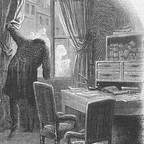Fifty Years Later, the Wicker Man Still Makes Outsiders of Us All
Beneath the British Isles, the old ways run deeper than even the locals can reach
In The Wicker Man, police officer Sergeant Howie (Edward Woodward) travels to the remote Scottish island of Summerisle to investigate the disappearance of a young girl. Over a few days spent questioning the community, he balks at their un-Christian beliefs and rituals — until he becomes wrapped up in one.
“It may be very difficult for someone to understand who is not British,” said Christopher Lee, who plays community/cult leader Lord Summerisle, of the film. (The American remake “bewildered” him.) Ignoring that its most iconic image was inspired by Gallic rituals, The Wicker Man draws heavily from the British subconscious, all pagan rituals and feudalism. It’s widely considered the best British film of all time. It is, like the society it depicts, fiercely protected by locals.
It nonetheless makes outsiders of even them.
Filming took place in a small town above the Scottish Highlands, where the devout community observed Sabbath from Saturday to Monday. The residents were, in the words of director Robin Hardy, “immensely helpful four days a week — but they’d pass us on the other days and pretend we weren’t there.” Their beliefs made them insular, even obstinate. But it didn’t stop there.
Hardy regularly clashed with veteran cinematographer Harry Waxman, who believed the director too young to be so central a force in the film’s production. Hardy was also stripped of final cut by producer Michael Deeley, who, in the words of Woodward and Lee respectively, “hacked” and “butchered” the film into its theatrical version. Even as I rewatched the film with commentary by Hardy, Lee and Woodward, I was amused to hear them continuously interrupt and make an outsider of moderator Mark Kermode.
The circle can always grow tighter. So Sergeant Howie warns Lord Summerisle: “If the crops fail, Summerisle, next year your people will kill you on May Day.” Even the most familiar places and people can make us feel like outsiders. So found Hardy, the cast and crew (and, of course, Kermode).
Hardy reports that, some years later, he revisited the pub featured in the film as The Green Man. It had hardly changed — the photos of Summerisle’s annual harvest festival merely replaced with production shots of the cult film. “Locals still talk about it like it was yesterday,” he recalled. Nobody remembers like they do.
Folk horror is full of ever-tightening circles. Follow to make sure you’re not left out of another.
